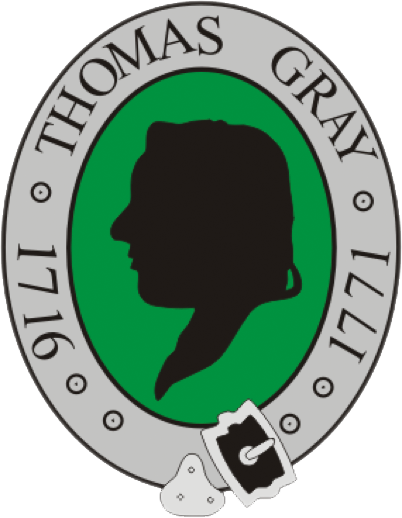Thomas Gray
Romantic poet with a close association to Stoke Poges
Thomas Gray (1716-1771) was an English poet. Born in Cornhill, London, he was the fifth of 12 children of an exchange broker and a milliner and the only child in his family to survive infancy. He lived with his mother after she left his abusive father.
Gray's connection with Stoke Poges and the surrounding area began at an early age. He would visit his aunt and uncle at West End House (now Stoke Court), and was educated at nearby Eton College where his uncle was one of the masters. He recalled his schooldays as a time of great happiness, as is evident in his 'Ode on a Distant Prospect of Eton College'. Gray was a delicate and naturally scholarly boy who spent his time reading great literature and avoiding athletics. It was probably fortunate for the young and sensitive Gray that he was able to live in his uncle's household rather than at college. He made three close friends at Eton: Horace Walpole, son of Prime Minister Robert Walpole, Thomas Ashton, and Richard West. The four of them prided themselves on their sense of style, their sense of humour, and their appreciation of beauty.
In 1734 Gray went up to Peterhouse, Cambridge. He found the curriculum dull. He wrote letters to his friends listing all the things he disliked: the masters ('mad with Pride') and the Fellows ('sleepy, drunken, dull, illiterate Things.') Supposedly he was intended for the law, but in fact he spent his time as an undergraduate reading classical and modern literature and playing Vivaldi and Scarlatti on the harpsichord for relaxation. In 1738 he accompanied his old school-friend Walpole on his Grand Tour, probably at Walpole's expense. They fell out and parted in Tuscany because Walpole wanted to attend fashionable parties and Gray wanted to visit all the antiquities. However, they were reconciled a few years later. Then, he wished his poems would become more popular.
He began seriously writing poems in 1742, mainly after his close friend Richard West died. Around this time, his mother came to live with her widowed sister in Stoke Poges and he became a frequent visitor, staying with them at West End. From his writings, it is clear that he loved Stoke Poges and the surrounding countryside.
He moved to Cambridge and began a self-imposed programme of literary study, becoming one of the most learned men of his time, though he claimed to be lazy by inclination. He became a Fellow first of Peterhouse, and later of Pembroke College, Cambridge. It is said that the change of college was the result of a practical joke. Terrified of fire, he had installed a metal bar by his window on the top floor of the Burrough’s building at Peterhouse, so that in the event of a fire he could tie his sheets to it and climb to safety.
Gray spent most of his life as a scholar in Cambridge, and only later in his life did he begin travelling again. Although he was one of the least productive poets (his collected works published during his lifetime amount to fewer than 1,000 lines), he is regarded as the predominant poetic figure of the mid-18th century. In 1757, he was offered the post of Poet Laureate, which he refused.
In 1762, the Regius chair of Modern History at Cambridge, a sinecure which carried a salary of £400, fell vacant after the death of Shallet Turner, and Gray's friends lobbied the government unsuccessfully to secure the position for him. In the event, Gray lost out to Lawrence Brockett, but he secured the position in 1768 after Brockett’s death.
Gray was so self critical and fearful of failure that he only published thirteen poems during his lifetime and once wrote that he feared his collected works would be 'mistaken for the works of a flea'. Walpole said that 'He never wrote anything easily but things of Humour.'
Gray was also known as one of the 'Graveyard poets' of the late 18th century, along with Oliver Goldsmith, William Cowper, and Christopher Smart. He died in 1771 and was buried beside his mother and aunt in a brick table tomb in the graveyard at St Giles' Church, Stoke Poges.
'Elegy' masterpiece
In 1750, his friend Lady Cobham moved to the Manor House in Stoke Poges. Gray visited frequently and it was there he wrote the comic poem 'A Long Story' - referencing residents of the Manor House.
It is believed that Gray wrote his masterpiece, the 'Elegy Written in a Country Churchyard', in the graveyard of the church in Stoke Poges in 1750. The elegy was a literary sensation when published by Robert Dodsley in February 1751 and has made a lasting contribution to English literature. Its reflective, calm and stoic tone was greatly admired, and it was pirated, imitated, quoted and translated into Latin and Greek. It is still one of the most popular and most frequently quoted poems in the English language.
In 1759 during the Seven Years War, before the Battle of the Plains of Abraham, British General James Wolfe is said to have recited it to his officers, adding: 'Gentlemen, I would rather have written that poem than take Quebec tomorrow'. The poem's famous depiction of an 'ivy-mantled tow'r' could be a reference to the early-medieval St. Laurence's Church in Upton, Slough.
The Elegy was recognised immediately for its beauty and skill. It contains many outstanding phrases which have entered the common English lexicon, either on their own or as referenced in other works.

